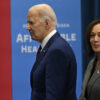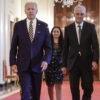Protest demonstrations over the killing of a militant separatist leader by Indian security forces led to weeks of turmoil in Indian Kashmir. Pakistan-based terror groups are now seeking to take advantage of the situation.
Hafiz Saeed—head of Jamaat-ud-Dawah (JuD)—warned of countrywide protests in Pakistan if Indian Home Minister Rajnath Singh visits Islamabad later this week for a regional meeting.
Given Pakistan’s long association with terrorist groups, it is incumbent upon the Pakistani government to prevent terrorist leaders like Saeed—who founded Lashkar-e-Taiba (LeT)—from exacerbating bilateral tensions between India and Pakistan.
The U.S. declared LeT a foreign terrorist organization (FTO) in 2001, and issued a $10 million reward for information leading to the arrest of Saeed in 2012 due to his alleged role in the 2008 Mumbai attacks that killed 166, including six Americans.
Pakistan’s failure to rein in Saeed would likely further isolate Pakistan on Capitol Hill. Earlier this year, Congress blocked U.S. government funding for additional F-16 transfers to Pakistan because of Islamabad’s failure to crack down on the Haqqani terrorist network that operates in Afghanistan.
Further spotlighting the dangerous consequences of Pakistan’s harboring of terrorist groups was news over the weekend that one of the individuals charged with involvement in last November’s terrorist attack in Paris had previously been a bomb maker for LeT.
If Pakistani military leaders are considering exploiting the civil unrest in Kashmir by unleashing anti-India terrorist groups, they should think again. The situation is different from the 1990s, when U.S. officials viewed the region primarily through a lens of Indo-Pakistani conflict prevention.
U.S. views toward the region are now more influenced by concerns about terrorist groups and the havoc they wreak, both regionally and on the international stage.
A visit by Indian Home Minister Singh to Pakistan this week has become even more critical, given the recent uptick in Indo-Pakistani tensions and the risk of military escalation.
Pakistan would be mistaken to let a dangerous non-state actor like Hafiz Saeed dictate its relations with neighboring India.



























